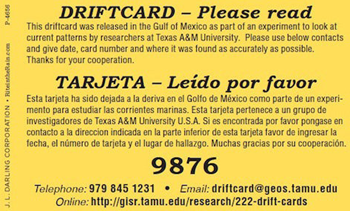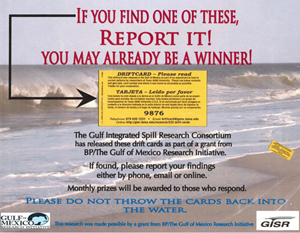You may already be a winner! That is what folks will read on posters across the Gulf region if they find and report bright yellow cards drifting in Gulf waters or washed up on beaches. This small biodegradable card is part of a larger research effort to better understand Gulf currents and improve future oil spill response.
This summer, scientists on research cruises, funded by the Gulf of Mexico Research Initiative (GoMRI), will drop these cards at various locations in the Gulf and keep a detailed record of the point of entry. Each card has a unique number and instructions for the public to call or email the card number and describe where they found it. To encourage public participation, people who report the location of cards they find will be eligible for a $25 gift card as thanks for their efforts.
Dr. Piers Chapman at Texas A & M University is the Director of the GoMRI-funded Gulf Integrated Spill Research Consortium (GISR) and leads this Drifter Card project. He and his team conduct research to improve prediction models for oil and gas transport and are refining these models using data they collect in field and laboratory experiments. Information from the drift cards are part of this important field data. Researchers will track the course of these cards on an interactive map to visually display Gulf currents.
This is not the first time that Dr. Chapman has used this method to successfully collect ocean data: “When I was in South Africa, we deployed drift cards on a regular basis around the country. We got about 2% of them back, including many from Australia or South America.”

Driftcard
Residents along the Gulf Coast states will soon see posters describing the Drifter Card program in area bait shops, marinas, local fish and wildlife offices, and other venues. GISR also plans to spread the word through public service announcements on local radio, television stations, and newspapers.
Dr. Chapman and his team hope that all who find cards will report their locations. While monthly drawings for gift cards provide an incentive, all residents who participate will help scientists learn more about Gulf currents, making everyone a winner.
This research is made possible by a grant from BP/The Gulf of Mexico Research Initiative. The GoMRI is a 10-year, $500 million independent research program established by an agreement between BP and the Gulf of Mexico Alliance to study the effects of the Deepwater Horizon incident and the potential associated impact of this and similar incidents on the environment and public health.

